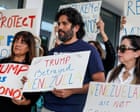
In a week filled with significant legal and political developments around the world, a series of events have brought to the fore pressing socio-political issues in the United States, Thailand, Australia, and beyond. Each one, a unique thread, weaves a narrative of resilience, change, and advocacy for social justice, as communities and leaders address the challenges ahead.
In the United States, a notable ruling by Judge Edward Chen in San Francisco temporarily halted the termination of legal protections for over one million individuals from Haiti and Venezuela. These individuals had been granted Temporary Protected Status (TPS) by the previous administration, allowing them to live and work in the country. The decision ensures that 600,000 Venezuelans can continue their lives in the U.S. despite the expiration of their prior legal protection. This moment of relief underscores the crucial debate surrounding immigration and lived experiences of migrants in the U.S.
Meanwhile, Thailand has witnessed a profound political transition. Anutin Charnvirakul, a business magnate known for his role in advocating cannabis decriminalization, has emerged as the new Prime Minister. His ascent follows intense negotiations among political factions after the ousting of former Prime Minister Paetongtarn Shinawatra. Anutin, a prominent conservative and royalist, promises to lead Thailand into a new chapter while the political landscape remains fluid, reflecting a blend of traditional values and progressive reforms.
Australia is contending with issues surrounding freedom of assembly, as neo-Nazi gatherings have sparked discussions regarding state protest laws. Recently, the steps of Victoria’s parliament became a platform for neo-Nazi demonstrations, leading to calls for revising existing “move-on” laws. Despite these demands, the current legal framework does provide police with significant enforcement capabilities, urging a balanced approach to maintaining public order while safeguarding democratic rights.
In a more poignant appeal, the Ukrainian community in Australia is calling for government intervention on behalf of Oscar Jenkins, an Australian citizen captured during military operations in Ukraine. With Jenkins imprisoned and facing a long sentence under accusations of being a mercenary, community leaders emphasize the need for his inclusion in ongoing prisoner swaps with Russia. This advocacy highlights the humanitarian dimensions of international conflicts and the profound need for diplomatic engagement.
Across Europe, the perspective on education shifts as Eva Alcón, a prominent advocate for higher learning in Spain, highlights the financial hurdles barring students from fulfilling their academic dreams despite being eligible for grants. Alcón’s observations reflect a broader concern over the sustainability of social mobility via education, urging enhanced public investment to ensure equitable opportunities for aspiring scholars.
These stories from different corners of the globe illustrate the intricate tapestry of human rights, governance, and social justice. They serve as reminders of both the challenges we face and the collective efforts required to create a more equitable and inclusive future for all. Each development, reflective of its local context, resonates with universal themes of resilience and the pursuit of a better world.
Source: {link}
